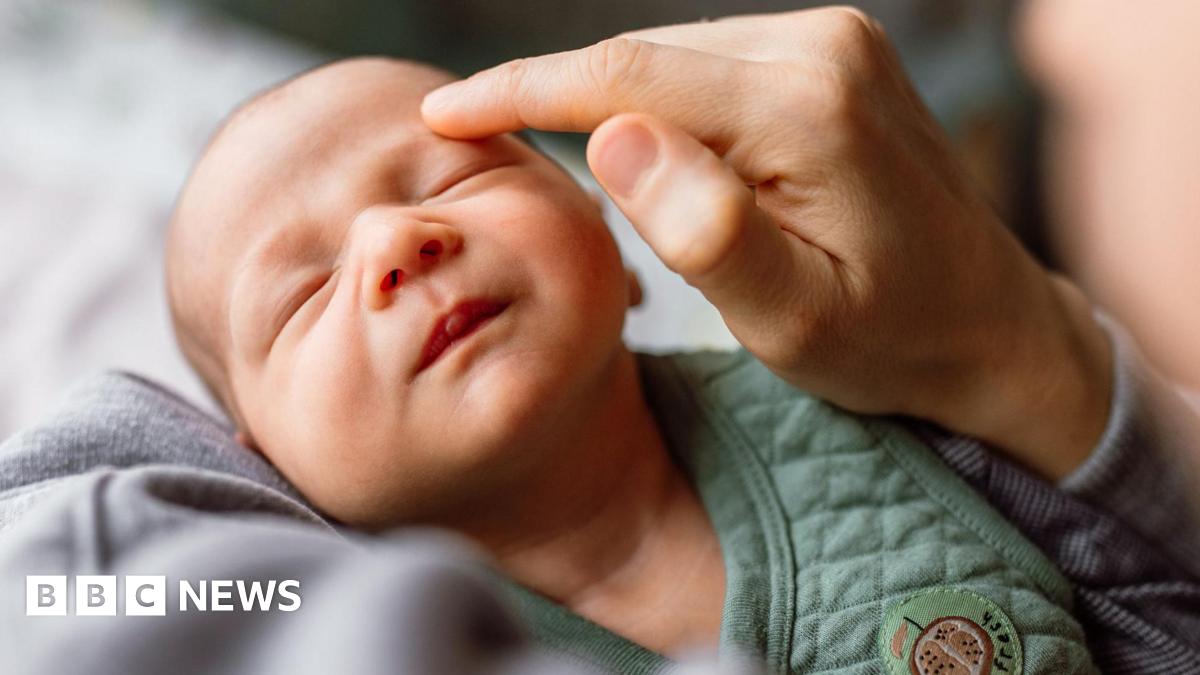The Impact Of Early-Life Microbiome On Hospitalization Rates

Welcome to your ultimate source for breaking news, trending updates, and in-depth stories from around the world. Whether it's politics, technology, entertainment, sports, or lifestyle, we bring you real-time updates that keep you informed and ahead of the curve.
Our team works tirelessly to ensure you never miss a moment. From the latest developments in global events to the most talked-about topics on social media, our news platform is designed to deliver accurate and timely information, all in one place.
Stay in the know and join thousands of readers who trust us for reliable, up-to-date content. Explore our expertly curated articles and dive deeper into the stories that matter to you. Visit Best Website now and be part of the conversation. Don't miss out on the headlines that shape our world!
Table of Contents
The Impact of Early-Life Microbiome on Hospitalization Rates: A Growing Concern
The human microbiome, a complex ecosystem of microorganisms residing within our bodies, plays a crucial role in health and development. Emerging research highlights a particularly compelling connection: the impact of the early-life microbiome on long-term health outcomes, including hospitalization rates. Understanding this connection is critical for developing preventative strategies and improving overall public health.
The Developing Microbiome: A Foundation for Health
The microbiome begins to develop even before birth, significantly influenced by factors like maternal diet, mode of delivery (vaginal vs. Cesarean), and early exposure to antibiotics. A diverse and balanced microbiome in infancy is associated with a robust immune system, improved digestive health, and reduced risk of various chronic diseases later in life. Conversely, disruptions to this delicate ecosystem – known as dysbiosis – can have significant consequences.
Dysbiosis and Increased Hospitalization Risk:
Studies increasingly link early-life microbiome dysbiosis to a higher risk of hospitalization throughout childhood and even into adulthood. Several mechanisms contribute to this:
- Weakened Immune System: An unbalanced microbiome can impair immune system development, making infants and children more susceptible to infections requiring hospitalization. This is particularly concerning for respiratory infections, gastrointestinal illnesses, and allergies.
- Increased Inflammatory Response: Dysbiosis can lead to chronic low-grade inflammation, potentially contributing to the development of conditions like asthma, eczema, and inflammatory bowel disease (IBD), all of which can necessitate hospitalization.
- Metabolic Disorders: Emerging evidence suggests a link between early-life microbiome imbalances and the development of metabolic disorders like obesity and type 2 diabetes, increasing the risk of hospital admissions related to these conditions.
Factors Influencing Early-Life Microbiome Development:
Several factors influence the development of the early-life microbiome and therefore the risk of future hospitalizations:
- Mode of Delivery: Vaginal delivery exposes newborns to a diverse range of beneficial bacteria, while Cesarean section births often result in a less diverse microbiome, potentially increasing the risk of dysbiosis.
- Antibiotic Use: While necessary in certain situations, early-life antibiotic use can disrupt the microbiome, potentially leading to long-term consequences. Careful consideration of antibiotic prescription is crucial.
- Diet: Breastfeeding is associated with a more diverse and beneficial microbiome compared to formula feeding. Introducing diverse solid foods at appropriate times also contributes to microbiome development.
- Environmental Factors: Exposure to environmental toxins and pollutants can also negatively impact microbiome development.
Future Directions and Preventative Measures:
Further research is needed to fully elucidate the complex interplay between the early-life microbiome and hospitalization rates. However, several potential preventative measures are emerging:
- Promoting vaginal delivery whenever possible: Understanding the benefits of vaginal birth for microbiome development is crucial for informed decision-making during pregnancy.
- Judicious antibiotic use: Minimizing unnecessary antibiotic use in infants and children is essential to protect the developing microbiome.
- Supporting breastfeeding: Encouraging and supporting breastfeeding practices can significantly contribute to a healthy microbiome.
- Dietary interventions: Promoting a diverse and balanced diet from infancy can positively influence microbiome composition.
Conclusion:
The impact of the early-life microbiome on hospitalization rates is a significant area of research with far-reaching implications for public health. By understanding the factors influencing microbiome development and implementing preventative strategies, we can potentially reduce hospitalizations and improve the long-term health of children and adults. Further research and collaborative efforts are crucial to fully unravel this complex relationship and translate findings into effective public health interventions. For more information on gut health and the microbiome, consider exploring resources from the .

Thank you for visiting our website, your trusted source for the latest updates and in-depth coverage on The Impact Of Early-Life Microbiome On Hospitalization Rates. We're committed to keeping you informed with timely and accurate information to meet your curiosity and needs.
If you have any questions, suggestions, or feedback, we'd love to hear from you. Your insights are valuable to us and help us improve to serve you better. Feel free to reach out through our contact page.
Don't forget to bookmark our website and check back regularly for the latest headlines and trending topics. See you next time, and thank you for being part of our growing community!
Featured Posts
-
 Trumps Investigation Into Biden Autopen Use And Concerns Over Cognitive Fitness
Jun 07, 2025
Trumps Investigation Into Biden Autopen Use And Concerns Over Cognitive Fitness
Jun 07, 2025 -
 Hype Builds Massive Lines For New 110s At Jd Sports Stores Nationwide
Jun 07, 2025
Hype Builds Massive Lines For New 110s At Jd Sports Stores Nationwide
Jun 07, 2025 -
 Lifetimes Kidnapped By A Killer Steve Guttenbergs Killer Performance
Jun 07, 2025
Lifetimes Kidnapped By A Killer Steve Guttenbergs Killer Performance
Jun 07, 2025 -
 Beyond The Mainframe Has Ibm Reclaimed Its Cool Factor
Jun 07, 2025
Beyond The Mainframe Has Ibm Reclaimed Its Cool Factor
Jun 07, 2025 -
 Forecasting Hurricanes The Unexpected Role Of Ghost Hurricanes
Jun 07, 2025
Forecasting Hurricanes The Unexpected Role Of Ghost Hurricanes
Jun 07, 2025
Latest Posts
-
 Bozichs Report Louisvilles Powerful Performance Secures 8 1 Win Against Miami College World Series In Sight
Jun 07, 2025
Bozichs Report Louisvilles Powerful Performance Secures 8 1 Win Against Miami College World Series In Sight
Jun 07, 2025 -
 Swiateks Clay Season Success Ignoring The Numbers
Jun 07, 2025
Swiateks Clay Season Success Ignoring The Numbers
Jun 07, 2025 -
 Israeli Gunfire Alleged In Gaza Aid Site Attack Expert Analysis And Eyewitness Testimony
Jun 07, 2025
Israeli Gunfire Alleged In Gaza Aid Site Attack Expert Analysis And Eyewitness Testimony
Jun 07, 2025 -
 Key Evidence Diary Reveals Motive Behind United Healthcare Ceos Death
Jun 07, 2025
Key Evidence Diary Reveals Motive Behind United Healthcare Ceos Death
Jun 07, 2025 -
 Prosecutors Diary Reveals Motive In United Healthcare Ceo Killing
Jun 07, 2025
Prosecutors Diary Reveals Motive In United Healthcare Ceo Killing
Jun 07, 2025
